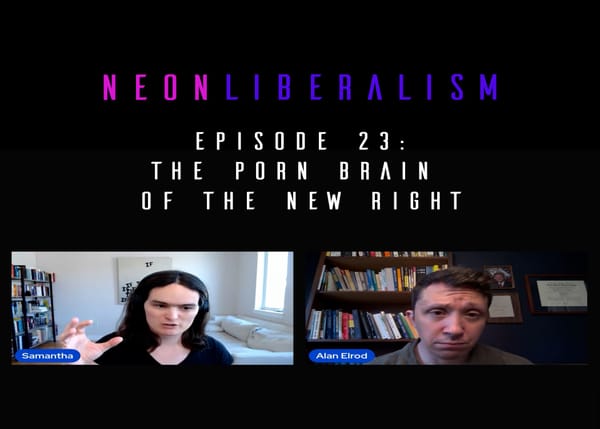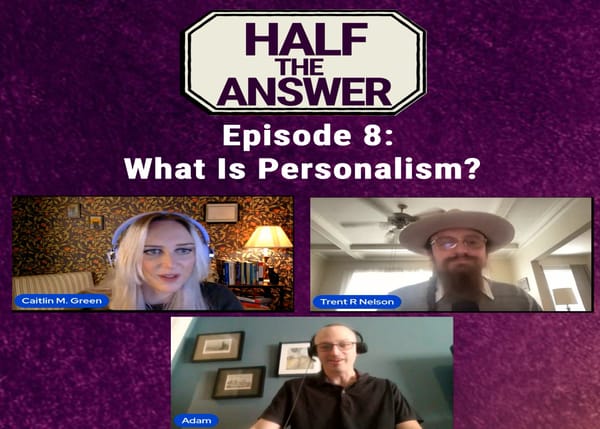Deradicalizing the Center

In 2016, the Washington Post ran a remarkable piece of journalism. Derek Black, a pedigreed, up-and-coming white nationalist leader had experienced an ideological transformation while a student at the New College of Florida.
After he was outed by another student as a white nationalist, the school reviewed Black’s academic record and chose not to intervene. This left the students in control of how to respond to his presence, and while most condemned him, a few befriended him. Those friendships formed the foundation of trust on which Black’s persuasion away from white nationalism rested.
The story is amazing. It resonated strongly with a certain kind of people—libertarians among them, and many sympathetic to liberalism but uncomfortable with the left and who, at least until recently, might have fit in the political center. These folks are often skeptical of condemning someone unless what they say is explicitly and intentionally problematic.
Frustration with this group is almost an internet pastime, and many won’t be inclined to extend to them much charity. But there is something deeply good about a stubborn insistence on the almost universal potential for redemption. A liberal society needs that potential. Without it, we definitely wouldn’t have the conversion of Derek Black.
More to the story
Libertarian and right- and centrist-liberal hand-wringing about censorious tendencies on the political left, especially on college campuses, was at a fever pitch in 2016. Speaker series and think pieces speculated that the future of free speech would be in trouble if young adults weren’t convinced to leave de-platforming and safe spaces behind and embrace open inquiry.
I think that many libertarians hoped that the story of Derek Black could act as a how-to manual for deradicalization that fit tidily with our priors. There’s no need to censor or censure someone whose views we disagree with. The key to building the trust needed to change someone’s mind is friendship.
It’s a beautiful idea. The problem is that it’s not what happened. Rising Out of Hatred, by Eli Saslow, details how Black was ostracized and cut off from the tight-knit campus community at New College. He even wondered about his safety on campus a few times. He read hundreds or thousands of vitriolic comments on the school’s message board. He moved off-campus in response to the outrage over his outing.
Libertarian commentator Robby Soave wrote, “Ostracizing Derek wouldn’t have made him any less racist: on the contrary, it would have driven him further into the arms of the white nationalist movement.” But that’s wrong. Black himself says that the ostracism about which libertarians and centrists can be such scolds was in his case indispensable. While it was his friends that ultimately convinced him to change his views, “Campus condemnation was the only reason I spoke to those people.”
Wishes for a simpler world notwithstanding, this shouldn’t be surprising. Black (now R. Derek Black, another break from his former identity) has been clear that ideological conversion is not only difficult but traumatic. Turning away from an ideology like white nationalism “means disconnecting from the network of human beings that you consider to be important to you. Changing your mind about something that’s deeply held is exactly the same thing as changing the people who matter to you.”
The problem with coded language
Commitment to openness to all ideas and all discussion flatters a common belief among many centrists and libertarians that they are in an important way above the fray of ordinary, vulgar politics. They flatter themselves that this makes them more “rational” and more likely to spot and check bias than someone who takes a side.
There is a persistent message that “The Woke”, rendered hysterical by vulgar politics, see the bogeyman of white supremacy, or the danger of it, everywhere. But Black told us something important: that white supremacists also see white supremacy, or its potential, everywhere. White nationalists see—in the common sympathy for worries about changing culture and immigration rates, opposition to affirmative action, emphasizing higher crime in racialized neighbourhoods, anxiety about running afoul of political correctness—ubiquitous sympathy for the premises underlying white nationalist ideas, and they capitalize on that sympathy to insist on the reasonableness of broader white nationalist concerns. That reasonableness is used to promote the underlying premises of white nationalism, all while denying a connection to anything like white supremacy. In short, white nationalists mock the idea that there could be white nationalism everywhere while working to make it so.
As a white nationalist, Derek Black participated in a change that has been underway for decades in the way white nationalism packaged, marketed, and mainstreamed its views. White nationalist leaders essentially adopted Lee Atwater’s approach to the Southern Strategy, eschewing racial slurs and explicitly hateful statements, preferring coded language about political correctness and the rights of white people. White nationalists are explicit that this is their strategy: “White nationalists have believed for decades that if they convey their message in the correct way, bundled up in the right packaging, they can get widespread support for it from people who share a lot of their racial views” but who are not white nationalists or even explicitly race-conscious (yet), says Black.
This strategy is a real problem for people who need racism to be explicit and intentional before it’s worth condemning the people and behaviour that support it. It’s a problem for people who have made openness to edgy ideas part of their identity.
This, unfortunately, brings me to Richard Hanania.
I started thinking about the present piece after I encountered Hanania’s argument for “enlightened centrism.” Hanania directly appeals to those who see themselves above the fray of ordinary democratic politics, are informed about basic economics and its implications for political analysis, and whose contrarianism compels them to consider arguments outside the mainstream. “Centrism” isn’t a position on the left/right spectrum but, says Hanania, a position above it. An enlightened centrist can analyze the world with a dispassionate rationality that’s out of reach to the politically inclined.
Frankly, it is written in a way that would have been appealing and persuasive to an earlier version of me. It provides a flattering portrait of how many (maybe most) libertarians see themselves.
To prove that “centrism” is about being above or detached from politics, rather than simply in the middle of left and right, Hanania offers the following list of people who he believes qualify for the label:
Left: Peter Beinart, Jonathan Chait, Freddie deBoer, Michelle Goldberg, Ezra Klein, Peter Singer, Noah Smith, Matt Yglesias
Center/apolitical: Scott Alexander, Josh Barro, Patrick Collison, Jonathan Haidt, Steven Pinker, Progress Studies types, Nate Silver, Alec Stapp, Andrew Sullivan, Nassim Nicholas Taleb, Derek Thompson, Cathy Young
Right: GMU economics department, Tanner Greer, Sam Hammond, Anatoly Karlin, Emil Kirkegaard, Razib Khan, Megan McArdle, Virginia Postrel, Steve Sailer
There are folks in the center who appeal to libertarians, but the real catnip is in Hanania’s “right” enlightened centrists. Libertarians will read this list and recognize GMU Econ (the economics department of George Mason University), with its commitment to market economics (also home to Bryan Caplan, who is praised separately in the piece), as well as Virginia Postrel, and Megan McArdle. To most libertarians, these are recognized, respectable people who have supported free markets and limited government. Many libertarians will also know Sam Hammond from his work at the more left-friendly Niskanen Center.
I’m willing to bet that most libertarians do not know Anatoly Karlin (a Russian white nationalist), Emil Kirkegaard (a sexist, homophobic, “race realist” who argues for pedophilia), Razib Khan (dropped by the NYT for writing for white nationalist publications), or Steve Sailer (a race realist and blogger for the far-right websites VDARE and Taki Magazine). But hey, if you like Austrian economics, you might like what these guys have to say! If Hanania likes both, their ideas are at least worth considering, right?
(Most libertarians do not know Tanner Greer either, but he seems fine. My sympathies to Tanner Greer.)
I was still considering how to make people see the implications of Hanania’s list when Christopher Mathias at The Huffington Post published an exposé of Hanania’s writing ten years ago for AlternativeRight.com and other far-right outlets, advocating for truly horrific ideas under the pseudonym Richard Hoste.
So that was easy. Or so I thought.
Not great, Bob
In 2019, libertarianism was aflutter after Rosie Gray of Buzzfeed published a profile of ex-alt-righter Katie McHugh in which McHugh revealed that she had been recruited to the alt-right through a connection made via the Institute for Humane Studies’ (defunct by 2019) journalism program. Despite the fact that McHugh’s introduction to the alt-right happened after the connection in question had left the IHS, the IHS laudably conducted an internal review to confirm that they hadn’t missed far-right activism under their roof. There was a public discussion and stock-taking as libertarians thought about how to respond to make it clearer that our ideology stands firmly against racism and reactionaries.
Unlike McHugh, who recalls being treated as somewhat disposable by the alt-right, Hanania (as Hoste) was recruited by Richard Spencer to write content like “Why An Alternative Right is Necessary” for Spencer’s website AlternativeRight.com.
By the time Gray wrote her profile, McHugh was basically living in hiding, her life in tatters. Her advice to anyone who had a run-in with ideas from the alt-right was to “get out while you can.”
At the time he was outed, Hanania was writing things that inspired this article.
Hanania offered an underwhelming response to his outing. He claims to have been young (he was in his mid-20s and at the University of Chicago Law School) and stupid (but not stupid enough to write under his own name) and that he’s renounced what he wrote about (sort of) and come clean (once he was exposed).
Hanania is more like Black than McHugh in that he is someone who’s garnered a lot of attention but not someone whose introduction to extremism came through a respectable institution. But there’s a lot less soul-searching this time around about how someone can see himself at home in both the libertarian and alt-right worlds. In fact, there have been many arguments against worrying about Hanania’s work. “He writes interesting stuff.” “He’s a friendly guy!”
The libertarians and centrists defending Hanania (by no means a universal position) have more ire for Mathias than they do for the ideas espoused by Hanania-as-Hoste. Scoffing at Mathias for reacting strongly against arguments for the political importance of racial differences in IQ requires ignoring that the basic premise formed Hoste-Hanania’s “scientific” argument for treating people as sub-human, that Hanania still argues racial differences in IQ help to justify arguments for more brutal policing of Black people, and that it bolsters dangerously illiberal political programs.
Hanania’s outing is a pallid comparison to Black’s conversion. Whether that’s evidence that not much has changed or evidence that bigotry just doesn’t sting like it used to, it’s not great.
Black told us that the goal of white supremacists was to raise the respectability of white supremacist concerns until they become something we’re attacked for rejecting outright, not something we’re attacked for believing. He told us that the idea was to advance this goal by using coded language and reasonable-sounding questions about things like cultural change and political correctness to help make racism and concerns about whiteness mainstream. He told us that we can’t just point to a lack of bald-faced bigotry and insist there’s no there there.
Richard Hanania’s portrait of “enlightened centrism” leads libertarians and centrists to believe that they’re too smart to be taken in by all that. That’s nicer than hearing you’re naively playing into extremists’ hands. But once again, too good to be true.
We can extend a lot of charity to Hanania without eliminating the problem of libertarians’ and centrists’ dogged determination to loudly defend him and his intellectual program. It’s not just true believers that white nationalists need. The defence of coded language, “just asking questions,” hostility to political correctness, and troll culture help white nationalists advance their ideas. Hanania surely contributes to the environment white nationalists are trying to cultivate, whether he’s clever and malignant or just stubborn and naive. We don’t have to litigate what’s in his heart. It doesn’t matter.
Good intentions don’t always lead to good outcomes. This is a problem with which libertarians, in particular, are familiar.
Time to change our approach
“He is a bold surgeon,” said Adam Smith, “whose hand does not tremble when he performs an operation upon his own person; and he is often equally bold who does not hesitate to pull off the mysterious veil of self-delusion, which covers from his view the deformities of his own conduct.”
There are a lot of good people committed to liberty and equal human dignity among libertarians and non-leftist liberals. But at some point, if we don’t do the work to understand how this keeps happening, we become wilfully ignorant. Examining one’s conduct to see where we’ve been duped is not easy. Part of the strategy of the far right is to make it harder still.
Libertarians and centrists have got to start listening to folks who escape extremist movements, and to the leaks that reveal the strategies those movements employ. We are part of their plans; we are vulnerable to their plans. They don’t ignore us, so we can’t ignore them. Dog whistles are supposed to be inaudible, and I don’t blame people for not always hearing them. But if we see all the dogs running in one direction, especially if it’s towards us, we should take note.
The need for such self-reflection and scrutiny is very annoying. I assure you it’s not the worst thing about the far right.
Extremist movements don’t only endanger the good names of libertarians and centrists (such as they are). By weaponizing good faith and generosity of interpretation, extremists put those habits in danger. And we need at least some people to foster good faith and generosity if we’re going to convert more Derek Blacks.
Good faith isn’t the only thing extremist strategy puts at risk. Culture warring makes engaging with bad ideas extremely costly. But good people really do need to engage with bad ideas. We are so much better at spotting other people’s bullshit than we are at seeing our own, and exposing bullshit is an important step in dismantling bad ideas. Bad ideas can be engaged without giving them respectability or a platform. This takes more care and thoughtfulness than we employ when we just present those arguments as interesting and assume the marketplace for ideas will reveal the truth, or when we ignore them because they’re just so unpleasant.
Black describes
What it means to be an outspoken white nationalist, or at least to be an outspoken person who is talking about ‘white’ stuff. We imagine it is the Nazi going down the street getting punched by ANTIFA and, certainly there’s some level of that, but we often miss that being an advocate for this means you get widespread support from very unexpected places. That can mean money, that can mean social support, that can mean someone in line coming and buying you coffee every morning … another demonstration of the potency of this message.
More libertarians and centrists have to get better at being vigilant about and pushing back against far-right and white-nationalist messaging. At the very least, resist the urge to buy the race realist a coffee and slap ’em on the back for making a great point about the Wokes. Don’t blurb books for folks that lend them aid and comfort.
This isn’t an argument to refuse to learn more about the ideas of the far right. It’s important to understand those ideas and how they’re mainstreamed and promoted because it’s important to be vigilant against lending them cover.
Countering white-nationalist and far-right ideology can and should be done without descending into the culture war. White nationalists will try to treat any attempt to counter them as left-wing culture warring to shield themselves from substantive criticism. Don’t let them.
Derek Black blew up his life to help us do better. If we listen to him, we just might.
“[White Nationalism] is a fringe movement not because its ideas are completely alien to our culture, but because we work constantly to argue against it, expose its inconsistencies and persuade our citizens to counter it.” – R. Derek Black, August 2019
Steve, this one’s for you.
If you are someone who has found yourself pulled into an extremist movement and you are looking for a way out, there is help for you. The story of Derek Black illustrates that you can leave and you will be forgiven. Visit Life After Hate for more resources and information.
Featured image is Desert Pipeline, by Ken Kistler




